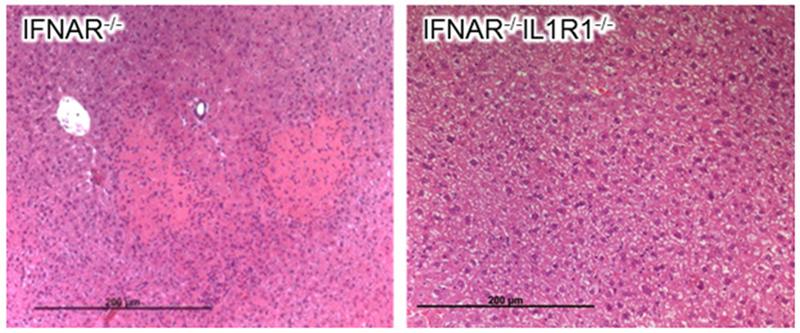

Histology of IFNAR-deficient mice after treatment with RNA: Mice with the interleukin-1β-receptor develop liver damage (left), while the liver of mice without this receptor remains intact (right).
Source: PEI
Due to its very high complexity and its pro-inflammatory and anti-inflammatory messenger substances (cytokines), the immune system is not fully understood yet. Type I interferons form a major group of messenger substances that influence more than 300 genes, thus significantly contributing to the activity of the immune system.
In previous experiments, Professor Dr Zoe Waibler, head of Section Product Testing of immunological biomedicines of Division ”Immunology” at the Paul-Ehrlich-Institut, and her colleagues found out how type-I-interferons can protect the liver.
Mice in which type I interferons are unable to mediate their effects (type I interferon receptor (IFNAR) deficient mice) developed severe liver inflammation after the respective treatment, while those animals that had the IFNAR did not.
This has been related to an imbalance of pro-inflammatory and anti-inflammatory cytokines of the interleukin-1 family.
In their current study, the researchers have asked the question why in IFNAR-deficient mice, only the liver, but no other organs, e.g. the spleen are affected by this damage. To find out, they used poly(I:C), similarly to their preceding studies.
Poly(I:C) is an artificial double-stranded RNA, which is able to activate the immune system in an unspecific manner, as is the case, e.g. in virus infections. The researchers were surprised to find that pro-inflammatory and anti-inflammatory cytokines in IFNAR-deficient mice showed an imbalance not only in the liver but also in other, intact organs.
Other important parameters, too, did not differ when the liver and the spleen were studied in mice with or without IFNAR: Other messenger substances of the immune system were largely distributed evenly in damaged and intact organs. The same applied to important immune cells.
Finally, the researchers discovered the difference: An important receptor is expressed (formed) in different ways in the organs: The receptor in question is the receptor for interleukin-1β, which is expressed in the liver but not in the spleen. Interleukin-1β is a cytokine with strong inflammatory properties.
Thus, in the absence of type I interferon, interleukin-1βis expressed upon poly(I:C) treatment to damage the liver but not the spleen, where the receptor for interleukin-1β is missing.
Findings on different distributions of important receptors in different organs provide a contribution to finding targeted therapies with fewer adverse effects.
Anzaghe M, Resch T, Schaser E, Kronhart S, Diez C, Niles MA, Korotkova E, Schülke S, Wolfheimer S, Kreuz D, Wingerter M, Bartolomé Rodríguez MM, Waibler Z (2019): Organ-specific expression of IL-1 receptor results in severe liver injury in type I interferon receptor deficient mice.
Front Immunol May 9 [Epub ahead of print].
https://www.pei.de/EN/information/journalists-press/press-releases/2019/08-new-f…












